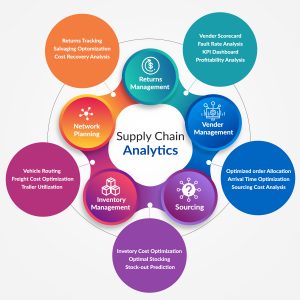
Supply chain analytics is a process where various machine learning, predictive modeling, statistics, and mathematics techniques are applied to recognise and identify meaningful knowledge and patterns in sensor, transactional, shipment, and order data.
The purpose of supply chain analytics services is to make organisations more efficient, this leading to improve their responsiveness as well as forecasting capabilities. These services can help businesses anticipate customer demands by adjusting their delivery services and inventory in a productive business way.
The importance of supply chain analytics
The importance of supply network analytics is growing vast every day. The never-ending flow of logistics networks include thousands of shipments and packages being moved all over the planet daily, and these supply networks are at the very core of the world economy.
Every existing business depends on this economic system, the amount of data that these supply network create. This is the new currency of today with many companies depend on data to add to the world economy effectively.
They depend on data to make decisions and achieve their business goals, and the competitiveness of your business depends on how well you handle data. Therefore, enterprises need strategies and tools to gain access to the most accurate data to understand that data and put it to good use.
One of the best ways to understand the data is by hiring professional supply chain analytics services, these companies deal with providing insights into data patterns of transaction flows. They analyse real time business transaction data to predict the future behavior of customers and suppliers.
These predictions give businesses leverage they can use against their competition to drive profit and revenues by increasing end to end visibility and enhancing trading partner performance management.
Strategies to Outsource Your Logistics Network Analytics
When to use analytics outsourcing?
The best time to use analytics outsourcing is during the integration phase when an external party manages the logistics network. Many companies face different kinds of integration issues. Still, SCM outsourcing can help businesses take care of these issues and focus on the primary competencies to meet consumer demand more effectively.
There’s also a competitive and strategic advantage in this, organisations that know when to use analytics outsourcing get greater flexibility in operating and maintaining their logistics network, which results in minimising overall cost and providing a more timely and efficient customer service.
Whom to outsource SCM analytics to
Every business needs an optimally designed logistics network to gain a competitive advantage, improve customer service and efficiency, and reduce cost. Furthermore, they need this network to cope with changes in demand, increasing consumer demand, reverse logistics, market costs, and many more.
So, developing the right network strategy is essential to achieving business goals. Therefore, the best solution is to bring in outside expertise.
A reputable, dedicated. professional team of consultants specialise in service processes, sales, marketing, production, supply, and design can significantly help support every segment of an organisation, from human resource and facility management to content writing, design, and marketing.
Business Benefits of Outsourcing Supply Chain Analytics
1. Transforming huge data inventory into actionable insights
Many factors impact the supply network:
- Complex and wide geographic coverage
- Increasing reduced response time demand
- Shortened product life cycles
- Increasing customer service pressure
- Rising costs
- Demand volatility
- Competitive supplier landscape
These factors increase the costs associated, and businesses need intuitive, analytics based strategies to improve customer service and reduce costs.
Some companies offer outsourcing services that can significantly help businesses transform data inventories into valuable insights. They can use these insights to develop an agile and efficient supply network by:
- Optimising distribution networks, operational costs, and inventory levels
- Improving customer service
- Minimising response time
- Accurately forecasting demand
- Monitoring and tracking key supply network performance metrics
2. Monitoring and keeping track of key supply chain performance metrics
Critical factors related to logistics network performance provide a perspective that companies can use to evaluate and assess their performance accurately.
This is essential to making the right decisions as performance metrics gauge unusual activity, dips, peaks, and growth. The main goal is to understand the company’s strengths and weaknesses and areas where they could improve their performance.
These metrics include:
- Time
- Cost
- Quality
3. Forecast demand by optimising inventory levels and minimising holding costs
Analytics outsourcing services are perfect for consumer goods and retail industries, these help businesses use various analytics techniques to create highly intuitive predictive models to gain insights into the consumer propensity to buy.
Organisations use these insights to forecast demand and plan their inventories accordingly. More importantly, they can enhance their revenue profitability and opportunities by planning replenishment based on consumer demand. This is an effective way to reduce costs of replenishment while minimising response time.

https://drive.google.com/file/d/1kzAUYJQnP9lNQavWCUHLj2bRCSrdS1D6/view?usp=sharing
4. Optimise operational costs
All businesses, especially start up and small companies, depend on business workflows, strategies, technology, and digital business models. These models help them harness the power of data, so it must be a model that corresponds to the business needs of organisations.
Professional analytics outsourcing companies can help businesses choose the right solution and harness top quality data to get rea time insights into every section of their logistics network. This is an excellent way to optimise operational effort and costs, save time, and improve customer service.
5. Minimise response times to boost customer service
The most significant trend in the business world is customer service. Businesses, have to be able to respond quickly to customer demands and requests as their competitiveness and success depend on that.
Analytics outsourcing can help with that by:
- Implementing customer service software – use the power of automation to improve your customer service
- Using email auto responders – improve the relationship with your customers by answering their emails promptly
- Setting time-based email alerts – avoid losing customer emails
- Using templates and text shortcuts – provide accurate answers to customer questions promptly and within a timescale
- Prioritising and categorising received emails – increase your response efficiency and improve customer loyalty
6. Optimise distribution networks
You need an agile and efficient supply chain network to cut down on the logistics network costs and improve your services. These logistics network costs are associated with end to end logistics network costs that include transportation, inventory, warehousing, production, and purchase.
Those companies that manage to optimise their distribution networks, could gain a substantial competitive advantage by implementing changes and evaluating different scenarios to improve their operations.
Leading to introducing new products or coping with changes in demand a lot easier, this leading to businesses making any adjustments necessary without disrupting their usual routine.
Conclusion
Running a successful logistics network business today means being able to cope with the changes in market conditions, customer demand, and business requirements.
If you use analytics outsourcing, you get a chance to earn all the benefits like global expansion, access to new channels, cost efficiency, time saving, and many more.
Deciding to outsource your logistics network analytics can only result in a more flexible and robust end to end supply chain, increased customer satisfaction and engagement, and added value to your business.
